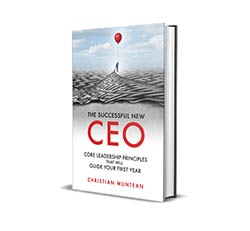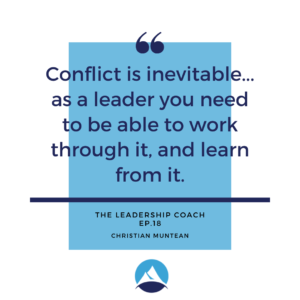How Avoiding Emotions Stunts A Leader’s Growth

 For many, year’s end brings up complicated emotions. It might be the holidays. It might be the end of the year functioning as a “measuring stick.” For those up north, it might be the darkness of winter.
For many, year’s end brings up complicated emotions. It might be the holidays. It might be the end of the year functioning as a “measuring stick.” For those up north, it might be the darkness of winter.
It’s been a challenging year. Next year is offering ambivalent promises. Some are optimistic, excited, energetic. Others are feeling anxious, frustrated, tired.
Many are feeling a difficult-to-understand combination of all of the above. You might relate. Or your employees. Your clients. Your partners.
Leading the Emotional Context
A recent study has indicated that one of the top concerns for CEOs right now was how to handle complicated emotions or emotional situations. As leaders, many of the people we lead and interact with are navigating an emotionally loaded context. Some do this more gracefully than others.
Some seem to have borne little personal cost along the way. Others appear heavily weighed down. It’s not always obvious who might feel what. Or how any particular experience will impact anyone.
It’s complicated. You have also navigated a challenging year.
Difficulty and Complexity Can Be Good
Let me use an extreme example to set the stage for the point I’ll make:
Dr. Richard Tedeschi (the University of North Carolina at Charlotte) is a psychologist and researcher specializing in grief and trauma – two of the most intense and complicated emotional scenarios. The common narrative surrounding trauma could cause many to believe it is a one-way trip to permanent dysfunction.
However, Dr. Tedeschi has found that between one-third to as many as one-half of the people who experience a traumatic event also experience what he has coined Post Traumatic Growth. They become stronger, more healthy, more resilient people as a result of their traumatic event.
How Leaders Can Use Complicated Emotions for Growth
Whether you are experiencing complicated emotions – or are interacting with someone who is – the following process will help you.
Recognize. Learn to recognize that there are feelings. And diverse ones. Not recognizing emotion isn’t the same as not having emotion. Some people experience and react to their emotions without awareness. In fact, others close to you may be more aware of your emotional state than you are.
Some only recognize one or two emotions. For example, anger or excitement. They don’t understand that a whole spectrum exists. This graphic, from The Gottman Institute, illustrates this spectrum well.
Learn to identify your emotions. You can address what you can recognize.
Acknowledge. There is a tendency to judge whether or not the emotion “has the right” to exist. “I don’t get scared.” “Oh, you’ll know when I’m angry.” “I don’t see the point in celebrating X.”
Some people believe that certain emotions are wrong. Others are ashamed of what they feel. For many, this is due to a false belief that a feeling necessitates a reaction. But being angry doesn’t mean you have to yell at someone. Jealousy doesn’t mean you need to “one-up” someone. Happiness doesn’t mean disrespecting someone else’s difficulty. Being attracted to someone doesn’t mean making a move.
Acknowledging your emotions allows you to grow in your ability to navigate emotionally complex situations and people.
Explore and Evaluate. Emotions are like “check engine” lights. They don’t give details – but shouldn’t be ignored. How I feel about you or a situation (good or bad) has very little bearing on what is real. But the feeling is real and is being triggered by something. If I really want to grow, I’ll explore what is triggering this feeling.
Triggers, for positive or negative emotions, are interpretations that we build up about reality. They often emerge from childhood – but can be generated from any intense or repeated experience. Emotional maturation comes, in part, from learning to recognize what kinds of triggers generate what kinds of feelings.
There seems to be a lot of energy put into warning people about triggers or how to avoid triggering someone. That fosters immaturity. I have triggers. But I don’t want to be a victim of my own triggers. I also don’t want to give the power of my emotional state to others. Insight into my triggers gives me the ability to make choices, not reactions, when triggered.
Decide. Even if I can’t put my finger on where the emotion is coming from – I can choose two things: 1) How will I act in response? 2) Do I want to continue feeling this?
The core point here is making a choice. Deciding. Courage is not the absence of fear. It’s about making the right decisions, even if afraid. Children and immature adults may be reactive. Mature adults and especially leaders need to be choosers.
Alignment
The happiest and most sane people (and often the most productive) are those who live aligned lives. Their decisions and actions are in alignment with their highest values and their vision for their life. For example, whenever I ask people about their highest values, they nearly always mention something along the lines of “honesty” and “respect.”
When facing complex emotions, bring your decisions and actions into alignment with your highest values and vision. This helps you navigate difficult emotions well. It’s a good compass in a storm. It will help you become a “bigger” and more resilient leader.
Take good care,
Christian
The Successful New CEO – FREE BOOK OFFER
As an executive coach, I’ve found that the experiences for new executives (or experienced executives in new roles) tend to touch on familiar themes. No one’s situation is the same. But there are common principles that, when followed, do guide executives to success. I introduce those core principles in my new book, The Successful New CEO. I’d like to give you a free copy (just pay shipping)!
situation is the same. But there are common principles that, when followed, do guide executives to success. I introduce those core principles in my new book, The Successful New CEO. I’d like to give you a free copy (just pay shipping)!
The book is divided into four parts:
- Becoming an Executive: Leaders can only lead out of who they are. How do you become the kind of person who successfully and gracefully inhabits this role?
- Seven Essential Executive Skills: The skills that earned you this new role may not be the ones that you need in the role. What are the key leadership skills that become even more important at the executive level?
- Leading Your Leadership Team: More than likely, you’ll be leading other leaders. How do you lead a confident, effective leader? How do you build a team out of leaders?
- First Things: Where do you start? How do you quickly build credibility and engagement? What is too fast or too slow?
The goal of The Successful New CEO is to help you quickly gain the confidence of your team, successfully address the issues you will discover, score early wins, and set a course for a fruitful future.
If you’d like to see how this book will benefit you or someone you know, I’d like to make it available to you for free! Click Here.
Find the value of your company with my free assessment tool: The Value Builder System
The Value Builder System™ is a 13-minute online questionnaire that evaluates your business on the eight factors that contribute more to its attractiveness and value. These factors are scored on a scale of 1-100. Businesses that score over 80 are likely to command 70%-100% higher value than others.
In my podcast, THE LEADERSHIP COACH, we explore effective, high impact and enjoyable leadership. We talk about personal development and the attributes that all effective leaders possess. I interview other leadership experts who share their knowledge and tips to help you build the confidence to lead and learn the habits of good decision-making.
Opportunities
Free Resource: How To Accomplish More Without Doing More is a workbook I created to walk leaders through a process of helping you own your calendar, liberate your time, and still get more done. Download it for free!
Executive and Leadership Coaching: Do you feel overwhelmed? Are you not getting the results you expect from the effort you are putting in? Do you find yourself facing similar challenges time and time again? Would you like to change specific ways of relating or reacting? If you would like to experience predictable, measurable growth Contact me.
Profitable Exit Strategy Workshop: Are you a business owner or partner? Are you over 55? Are you starting to think about exiting your business or active management in the next 3-5 years?
- Are you curious about what your business might be worth?
- Would you like to discover the specific steps you need to take to increase its value and become highly attractive to a buyer?
- Are you planning on handing it over to family or employees and you want to ensure long-term success?
If so, contact me now
Article Categories
Popular articles

Download my free 10-page eBook:
How To Accomplish More Without Doing More:
Eight Proven Strategies To Change Your Life
Discover how to save eight hours during your workweek-even if you're too busy to even think about it. The resource every maxed out executive needs.
